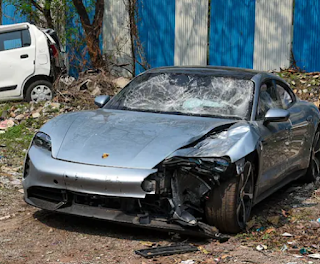The Bombay High Court acknowledged on Friday that the teenage accused in the Pune Porsche accident was also experiencing trauma and should be afforded some time to recover.
The incident occurred on May 19 when the teenager allegedly drove a Porsche at high speed while intoxicated, resulting in a collision with a bike and the deaths of two software engineers, Aneesh Awadhiya and Ashwini Koshta.
Initially, the Juvenile Justice Board granted the teen bail on the same day, mandating that he be placed under the supervision of his parents and grandfather. One of the conditions of his bail was that he write a 300-word essay on road safety.
However, the police later sought to amend the bail order, and on May 22, the board ordered that the boy be taken into custody and placed in an observation home.
During the hearing, Justices Bharti Dangre and Manjusha Deshpande criticized the approach of the Pune police, noting that the minor was first granted bail and then, under public pressure, was suddenly placed in an observation home.
"Two people have lost their lives. There was trauma, but the child (juvenile) was also in trauma, give him some time," the Bombay High Court said while questioning the prosecution during the hearing of a plea filed by the teen's aunt seeking his release from the observation home.
The bench questioned the legality of the police's actions, asking under what provision of law the bail order was amended and how the juvenile was subsequently confined.
Advocate Aabad Ponda, representing the juvenile's aunt, argued that the police had not challenged the original bail order but had instead sought an illegal modification. Ponda claimed that the boy's fundamental rights had been violated.
"A free citizen's personal liberty has been trampled upon. Can a child be taken into custody when he has been granted bail and the bail order is in force?" Ponda asked. He emphasized that there was no legal provision allowing such a review of a bail order.
The bench noted that the boy had been taken into custody and remanded to an observation home multiple times since the Pune police filed their application.
"What type of remand is this? Where is the power to remand? What kind of procedure is this where a person has been granted bail and then a remand is passed taking him into custody?" the court inquired. The bench pointed out that the boy had been removed from the care of his family and placed in an observation home, contrary to the statute's intent.
The bench further questioned Chief Public Prosecutor Hiten Venegaonkar, representing the Pune police, on why they did not seek to cancel the bail instead of amending it.
Venegaonkar argued that the remand orders were valid and that there had merely been a change in guardianship, with the boy now under the supervision of a probation officer instead of his parents.
He acknowledged that the original bail order was passed "rightly or wrongly" but contended that subsequent developments, including alleged tampering of evidence, warranted the actions taken. Venegaonkar also mentioned that disciplinary action had been taken against the officers and doctors involved, stressing that a strong message needed to be sent to society that one cannot simply write a 300-word essay to avoid serious consequences.
The teenager remains in an observation home until June 25, and the court has reserved its decision on the aunt's plea until then.



